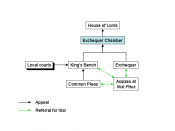In order to answer the question, the terms must first be evaluated, and most importantly the term 'breach of statutory duty' must be explained: Some statutes lay out certain conditions that apply to certain groups of people, stating a certain manner in which things should happen, in order to protect a certain group of people to whom a duty of care is owed. If things are not kept the way the statute dictates, then there can be said to have been a breach of statutory duty. Let us look at an example: Statute Law sets the national speed limit as 70mph on motorways and if a citizen drives at say, 90mph, he or she, according to the statute, should be penalised by means of a speeding fine. In this example, the citizen is breaching the statutory duty of care to not drive too dangerously that he or she owes to society.
There is no question as to whether any common law action is possible because the statute expresses the civil action to be taken. It is often that the statute does not express the action to be taken, leaving this for the Court to decide. When this is the case, a person who has suffered damage as a result of the breach has the chance to succeed in an action for breach of statutory duty.
It must be understood that this type of action is a common law action, a civil action, but the duty of care that has been breached is not a common law duty of care, where proximity between the claimant and the defendant must be present, but a statutory one. Legislation is the key aspect to be judged by the Court, and some sort of civil action will be taken, even if...


